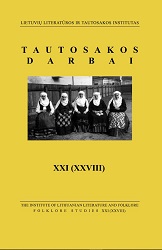Lietuvių ir latvių paremijos: raiška ir funkcionavimas
Lithuanian and Latvian Paremias: Expressions and Functioning
Author(s): Lilija KudirkienėSubject(s): Customs / Folklore, Comparative Linguistics, Baltic Languages, Phraseology
Published by: Lietuvių literatūros ir tautosakos institutas
Keywords: comparison of Lithuanian and Latvian proverbs; Elza Kokare; Jēkabs Lautenbahs; Kazys Grigas;
Summary/Abstract: The comparison of Lithuanian and Latvian proverbs was conducted by Jēkabs Lautenbahs (1915), Elza Kokare (1967, 1978, 1980), and to some extent by Kazys Grigas (1976). Proverb analogues of the two languages were published by Lautenbahs (1915) and an extensive collection of Lithuanian proverbs with their equivalents in other languages by Grigas (1987); a separate collection of Latvian proverbs with Lithuanian counterparts was issued by Kokare (1980). In some cases Lithuanian proverbs were accompanied by their Latvian equivalents in Lietuvių patarlės ir priežodžiai, vol. 1 (Vilnius, 2000). According to Kokare’s data, only 10 per cent of all the Latvian proverbs are genuinely Baltic. An overwhelming majority of common Lithuanian and Latvian proverbs are international. Specifically Lithuanian-Latvian analogues are very few (cf. Lith Duona – ne marti: suvalgysi, ir nebėr ‘Bread is not a daughter-in-law: once you eat it and its gone’ / Latv Maize ne vedekla: gan jau apēdīs ‘Bread is not a daughter-in-law: you’ll eat it in some way’), yet their variation is different and based on individual traditions of the respective languages. The majority of the shared adequate or analogous paremias are to be treated as Baltic internal borrowings, generally used in limited areas on both sides of the border. The fact of the borrowing is sometimes attested by the lexis. Traditional European types of proverbs can be supplemented by those expressing a common idea without using analogous lexical resources in different languages, e.g. Lith Puodžius šukėj verda ‘The potter cooks in a potsherd’ / Latv Glāzniekam nekad nav veselas rūtis ‘The glazier’s windows are always cracked’. Specific proverbs are found mostly among the sayings, in particular among traditional phrases, used in certain situations (e.g. when somebody whispers, falls down, wears one’s clothes on the wrong side out or two different socks or stockings, asks for a loan, for a favour or for something to eat, complains of the dark, does not know what to do next, does not want to answer a question or to repeat one’s words, etc. These are phrases such as “what will happen”, “what to do”, “it seems”, etc., provoking humorous reactions to somebody’s words). This group also comprises traditional phrases, used for a certain purpose, i.e. to make fun of somebody, to snub or threaten somebody, etc. Though expressions of attitude may be similar and traditional, these sayings containing reactions are distinguished by their piquancy, diversity and resourcefulness; they are often based on consonance, for which equivalents can hardly if ever be found in other languages or even dialects.
Journal: Tautosakos darbai
- Issue Year: 2005
- Issue No: 30
- Page Range: 43-56
- Page Count: 14
- Language: Lithuanian

